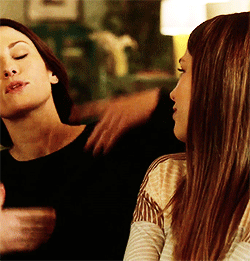We’re not normally huge fans of the ‘fallen superhero’ trope, especially since almost every DC film in the past decade has purposefully set out to make heroes a dark shadow of themselves. We’re looking at you Nolan and Snyder. That being said, Supergirl manages to create a compelling fall for Kara that hits the appropriate balance of seriousness, depth, resolution, and hope. It packs an emotional punch without veering into gluttonous revel in Grimdark territory. And when Supergirl packs a punch, it packs a wallop. So get ready for the good kind of crying because getting kicked in the feels never felt so satisfying.

Quick Recap of Episodes 11-16: The Icarus Nosedive
Slow and steady wins the descent into fallen heroes. Kara starts to fall long before she encounters the red kryptonite. It starts small: interfering in other people’s concerns in a way remarkably similar to Steven Universe and learning how react to other people’s boundaries. Her vigilantism grows as a direct response to Lord acting above the law and directly threatening her person, her family, and her as an agent of a government agency that protects national security. She reacts to the people and experiences in her life with a growing sense of frustration. She’s overwhelmed, overworked, and isolates herself in unhealthy ways as a protective mechanism both for herself and others she perceives herself as hurting. Her arc culminates with all her worst thoughts about people spilling out and taking over her life. Damn, if that doesn’t sound relatable.
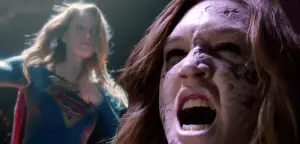 In a way, this part of her arc reveals her to be her own worst enemy. She’s faced with not one, but three alternate versions of herself that she must physically and psychologically distinguish herself from: Lord’s twisted doppelganger Bizarro, the Master Jailer as an extreme version of her mother’s absolute justice, and red kryptonite Kara. Additionally, the Black Mercy tempts her to choose a delusion of herself and family over reality.
In a way, this part of her arc reveals her to be her own worst enemy. She’s faced with not one, but three alternate versions of herself that she must physically and psychologically distinguish herself from: Lord’s twisted doppelganger Bizarro, the Master Jailer as an extreme version of her mother’s absolute justice, and red kryptonite Kara. Additionally, the Black Mercy tempts her to choose a delusion of herself and family over reality.
With each confrontation and temptation, Kara must choose who she is going to be moving forward. Will she allow her past, other people, her desire for justice, or even her own bad thoughts determine her path? Or, will she find balance, reach out to her loved ones, and climb back up to the top no matter how hard it is?
Episode 11: Strange Visitor From Another Planet
The one about bigotry, healing broken families, and Kara trying to fix everyone’s problems.
Senator Miranda Crane is in town for an anti-alien rally, and Cat sends James to get an offensive quote for headlines/get Crane to hang herself in the media. Kara worries about Winn being polite but distant when a cute guy tries to chat her up about Cat Grant. Oops! Turns out cute guy at the coffee shop is Adam Fisher, Cat’s son. Kara sent a letter to him to try and mend his relationship with Cat. Cat agrees to dinner with him, fires Kara for meddling, then unfires Kara after she gives an impassioned plea for Cat to take the second chance with Adam Kara never got with her own family. Crane is being xenophobic at the rally when an alien attacks. J’onn has a flashback of Mars, but Alex and Supergirl take the senator to the DEO. Cat and Adam’s dinner goes poorly. Kara and James figure out that the alien had shapeshifted into the Senator, who is at the DEO trying to figure out which of them is an alien. Crane/The White Martian attacks J’onn (a Green Martian) but escapes.
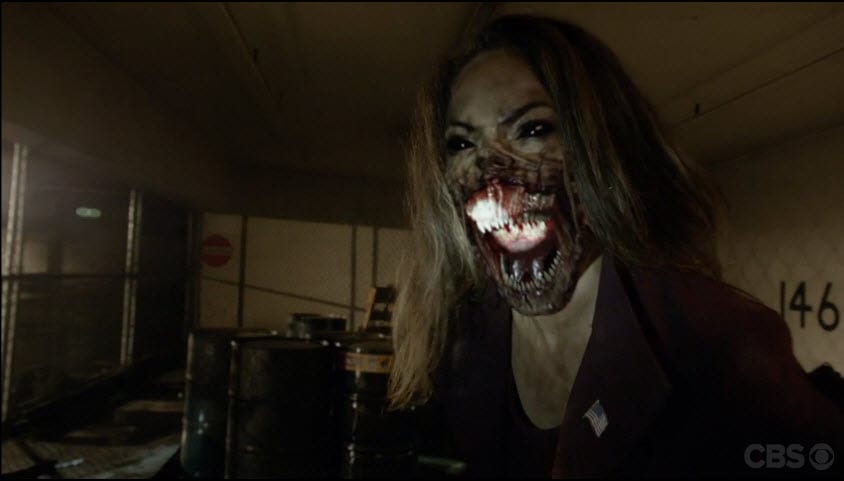
J’onn tells Alex all about how the White Martians are Nazis massacred his people after putting them in labor camps. Cat chews out Kara for her no good very bad dinner and Kara vows to fix it. Kara gets Adam to give Cat a second chance and it works. J’onn vows to kill the White Martian, even if it means sacrificing himself, because he’s lonely and tired of being the last Green Martian. Alex and Kara end up talking him down, and he chooses to imprison the White Martian instead.
He opens up about his two daughters to them, and they all have a beautiful found family moment. The real Senator Crane changes her mind about aliens being all bad. Adam decides to stay in town because he has a crush on Kara (which is adorable because he’s played by Melissa Benoist’s real life hubby Blake Jenner). Alex and Kara have a sister moment and see a second Supergirl saving people on TV!
Best Quote: “I lost everything – everyone. It makes a hole in your heart. But you can’t fall into it. You have to fill it. You have to fight. Do not throw away who you are. If you do that thing wins and the last son of Mars dies, even if you’re still standing.”—Kara Danvers, to J’onn when he wants to die killing the White Martian
Episode 12: Bizarro
The one where Kara gets a (genetically engineered, murderous) doppelganger and learns about boundaries.
Flashback to three months prior where Maxwell Lord has a Frankenstein moment pumping some black stuff into an unknown girl who turns out to be…the second Supergirl! Cat dubs the new not!Supergirl “Bizarro”. Alex, Hank, and Kara discuss Lord being behind the new hero. Cat is nice to Kara because she’s going out with Adam, which weirds out Kara (and James). Lord brainwashes Bizarro to try to kill Kara because she’s ‘bad’. Kara has to bail on her date with Adam to save a tram. Bizarro shows up; they fight; Kara saves the tram. Cat consoles Adam about Kara bailing; Adam and Kara take a rain check. Team DEO decide to try using kryptonite to weaken Bizarro. Bizarro struggles to view Supergirl as being ‘bad’, but Lord doubles down on the ‘Supergirl is evil’ talk. Team Winn the superhacker figure out that Lord has gone through seven (now dead) girls to get to Bizarro. Alex confronts Lord, whereupon he claims Bizarro is humanity’s true savior, threatens Alex, and defends using the girls in his experiments (gross).
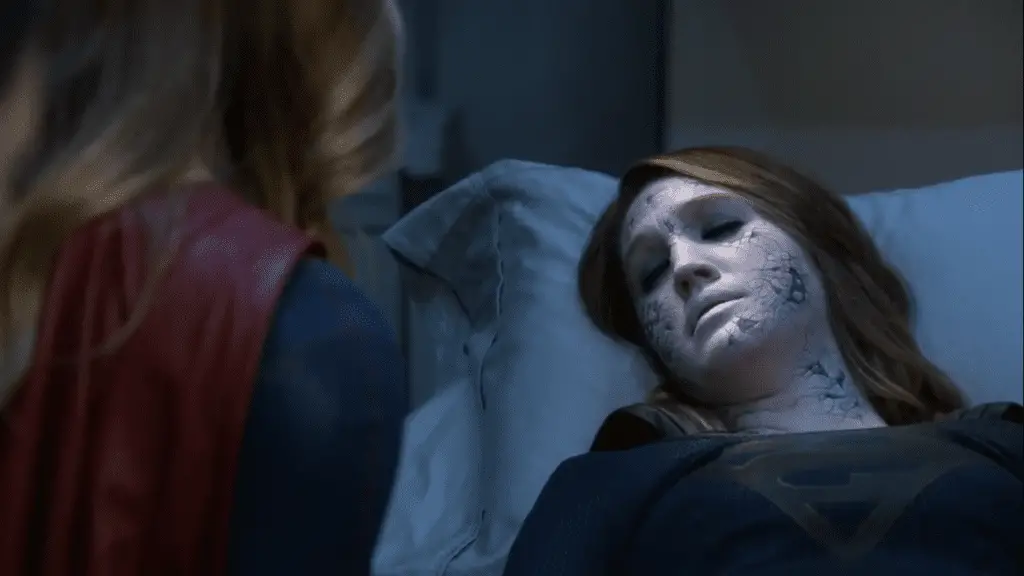
Hank explains that they can’t imprison Lord because the DEO doesn’t exist and he’s a private citizen. Winn tells James he’s being a big hypocrite for dating Lucy when he really likes Kara. Kara goes out on her date with Adam and as they’re getting all kissy-faced, Bizarro kidnaps her. Kara and Bizarro fight again, and it turns out they have ‘opposite’ powers (heat breath instead of freeze breath, e.g.), so the kryptonite darts only make Bizarro stronger (as well as degrading her face). Kara ends things with Adam, which upsets Cat. Lord tells Bizarro to go after the people Supergirl loves, so she kidnaps James. Alex imprisons Lord in the DEO to protect Kara. Kara finds James (after he admits to Bizarro that he loves Kara), fights Bizarro, and they take her down with the anti-kryptonite darts. Kara comforts Bizarro as they put her back into a medically induced coma. Lord threatens Eliza Danvers. Cat throws up some boundaries and her and Kara’s relationship. James does the same. Kara flies home and is attacked by a tentacled monster that hatched on her coffee table.
Best Quote: “We all feel ugly sometimes, we all feel like no one loves us, like maybe they never will…People don’t love [Supergirl] because of what she looks like on the outside, I love her because of who she is, because she’s brave, because she’s kind, and she always tries to do the right thing. And you can be the same. You’re not a monster.”—James Olsen, to Bizarro
Episode 13: For the Girl Who Has Everything
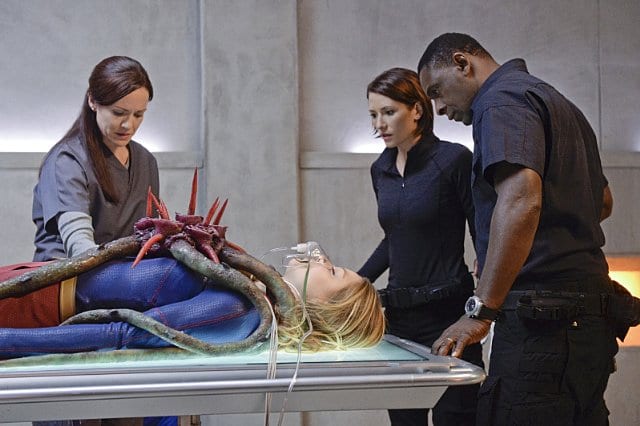
The one that is an homage to a beloved Superman comic.
Kara wakes up in her old bed from her old room on Krypton! What the…? At Catco, Cat thinks Kara is missing because of Adam, but Winn and James are worried enough to call Alex. They find Kara with the weird plant/octopus hybrid on her chest, which Alex promptly blames on Lord (fair, given he tried to kill Kara with Bizarro last episode). Meanwhile, Astra and Non are back—using a solar storm to help implement project “Myriad—and Non confesses he sent a Black Mercy to Supergirl to keep her out of the way because Astra is a party pooper and won’t let him kill Supergirl. Kara wonders if any of her visions are real, but is slowly losing her memories of Earth. Cat threatens to fire Kara if she doesn’t come to work, so J’onn reluctantly agrees to take Kara’s place. To hilarious effect. Angry with Non for going behind her back, Astra tells Alex that Kara needs to reject the fantasy herself in order for the Black Mercy to release her.
Alex wheedles Lord into helping her free Kara using virtual reality to get her into Kara’s Black Mercy fever dream. Non questions Astra’s loyalty, and she lies about helping Alex free Kara. Hank recruits Winn to help deal with the solar storm messing with their satellites. Alex gets through to Kara, who wakes up and puts Non on the top of her lock-em-up list. Winn finds Non and Astra have been piggy-backing on Lord’s satellites, so the DEO sends out teams to the 6 satellite farms to stop their plan. Kara confronts Non’s team, but he gets away. Astra fights J’onn, but Alex stabs her with a kryptonite sword before she can kill him. Hank takes the fall for it to protect the sisters’ bond. Non vows revenge. Kara tells her friends that she came back for them, her true home (Awwwww). Alex passes up a chance to tell Kara the truth about Astra.
Best Quote: “[Supergirl] never stopped believing Astra could be saved, that’s the difference between soldiers and heroes.”—J’onn J’onzz
Episode 14: Truth, Justice, and the American Way
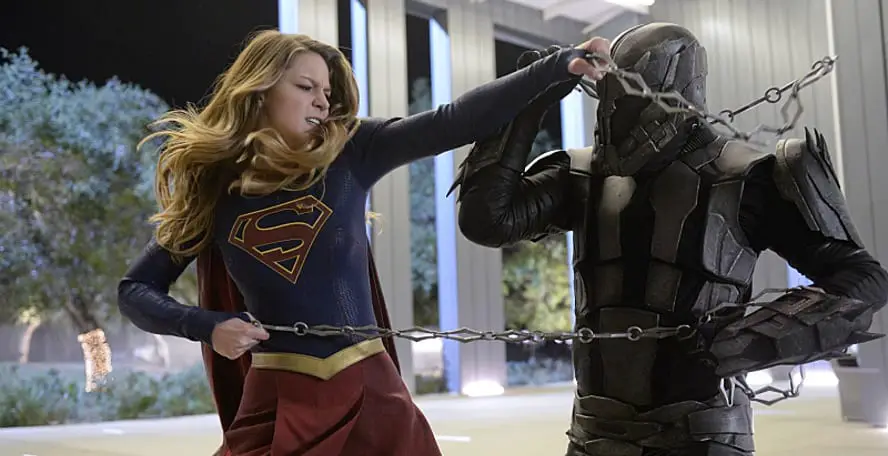
The one about questionable vigilante justice.
Alex passes up another chance to tell Kara the truth about Astra. Non invites Kara to lead the funeral rites for Astra, then gives her two weeks free of him while he mourns his wife. Kara is mad at Hank for Astra and refuses to release Lord from DEO custody. Cat hires another assistant named Siobhan Smythe and demotes Kara to assistant #2. Suspicious of Lord’s absence, Cat puts James on the case (not knowing he knows where Lord is). James confronts Kara about taking justice into her own hands. Meanwhile, Judge Dredd Master Jailer from Fort Rozz beheads a Fort Rozz prisoner the DEO was after. Alex goes to the police to see if they’ve had any missing persons that Master Jailer might have taken. Siobhan tries (and succeeds) to get a rise out of Kara about James. The DEO tracks down the Jailer’s next victim Prisoner 2445 (he’s conveniently going in number order) and Supergirl saves him. Cat gives James a pep talk about Responsible Journalism, and he confronts Kara again about keeping Lord locked up.
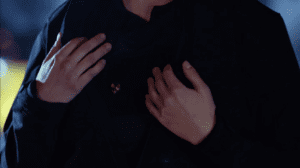
Kara and Alex chase down one of the cops, who turns out to be the Jailer. Kara is kidnapped along with Prisoner 2445, alias Alphonse Luzano, and Alex survives being shot due to a bulletproof vest. Luzano tells Kara that he became a drug dealer to help one of his wives, who was dying. He vowed to live a better life on Earth, which he’s done, but the Jailer believes in absolute justice, much like Alura who imprisoned Luzano in the first place. The Jailer tries to recruit Kara for his cause, but she refuses.
Alex prevents the Jailer from killing Kara and Luzano. Kara lets Luzano go back to his normal life and returns to the DEO to give Lord his second chance by letting him go as well. Alex backs this up with a file the DEO could use to destroy him if he tried to take them down. Kara thanks James for being her conscience. He asks her if he can tell Lucy she’s Supergirl. Kara tells Hank she’s not sure she wants to work for the DEO anymore.
Best Quote: “That’s why we’re driven to tell the truth, not just because we want to be good journalists but also because we want to be good people.”—Cat Grant
Episode 15: Solitude
The one about liars. Also, Team Supergirl goes on a break.
Alex passes up (yet another) opportunity to tell Kara about Astra when she tries to convince Kara to come back to the DEO. Siobhan continues being petty and gets in trouble for not opening Cat’s mail when Kara tells her she ought to. Cat refuses to dox members of an Ashley Madison-style website, but Siobhan keeps the incriminating thumb drive for herself. Alex lets out some steam with Hank because she hates lying to Kara. James confronts Kara (again) about telling Lucy she’s Supergirl; she says no (again). Lucy confronts James about his penchant for ditching her for his superhero friends. The hacker is mad Catco refused to publish the cheating website list and messes with the traffic lights. Winn traces the hacker, who then materializes from the computer and attacks them. Fleeing, she meets up with Non (they have history) and tries to twist Myriad into an agent of Earth’s destruction rather than its salvation, as Astra wanted. The DEO recruits Winn to hack for them, so James and Kara go to the Fortress of Solitude for answers about the hacker; she’s Braniac 8, now calling herself Indigo, the most notorious criminal in Fort Rozz.
James and Lucy’s relationship continues to devolve, and we learn that Indigo was trying to get access to nuclear launch codes. Indigo succeeds in setting off a nuke. Kara has to stop it, but only by working with the DEO again. Winn sets some malware against Indigo while Indigo reveals that she is the one who got Kara and Fort Rozz out of the Phantom Zone. Indigo explodes in a tornado of pixels. Back at Catco, Siobhan makes out with Winn after he sympathizes with her about her messed up dad. Kara agrees to let James tell Lucy about who she really is, but before he can, Lucy breaks up with him. She realizes he and Kara love each other even if they can’t admit it. Kara returns to the DEO, and Alex finally admits she killed Astra. Kara looks like she’s going to leave, but instead hugs Alex and silently thanks Hank for what he did. Non talks to dismembered Indigo about doing things ‘his way.’
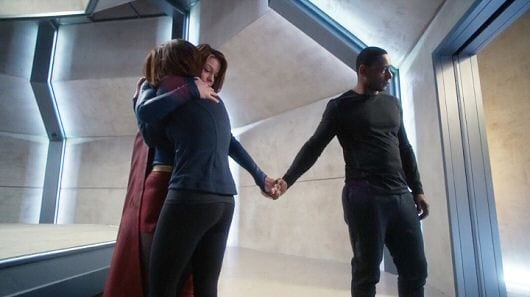
Best Quote: “I know how it feels when someone like [your father] lets you down. But I think… I just think it’s important for you to know that most people wanna be there for you.” Winn Schott, Jr., to Siobhan about her dad cheating and destroying her family
Episode 16: Falling
The one with more sexual tension that the entire rest of the series, and Kara goes full-on Man of Steel era Superman.
Cat talks Supergirl up on The View The Talk (because that’s not going to bite her in the ass this episode) while Kara rescues a girl from bullies. At work, Kara sees Winn and Siobhan getting it on in the supply closet. Kara tries to comfort James about his breakup with Lucy; Alex encourages Kara to tell James how she feels. Senator Crane is back and wants to get the DEO more funding (and maybe get with Hank?). Kara rescues a trapped firefighter but comes under the influence of red kryptonite (oh noes!). Kara wakes up the next morning in an inhibition free mood and proceeds to wear a sassier wardrobe, show up Siobhan, and win back Cat’s approval. She also chases down a Fort Rozz baddie but lets him go. Hank confronts her, she calls him out for hiding his true self and letting her fight all the bad guys while he ‘hides’ (she’s not entirely wrong…). Siobhan tries to break the news about Supergirl letting the baddie go, but Cat says no. Kara reveals that Siobhan was going to send the evidence to the Daily Planet, so Cat fires Siobhan. Cat kind of likes Kara’s new assertive attitude and definitely doesn’t like backstabbing and disloyalty.

Kara takes Winn and James out to celebrate at a club, and comes onto James while trash talking Lucy. James confronts her for not being herself. Cat yells at Supergirl for letting the baddie go. Supergirl whines about enabling humanity’s helplessness, mocks Cat for claiming to be the ‘most powerful person in National city’, and throws her off the balcony. Supergirl saves her, announcing that true power is deciding who lives and dies. Hank and the DEO find the red kryptonite, a synthetic kryptonite created by none other than resident douche canoe Maxwell Lord to trap Non. He offers to ‘help’ and they let him. Cat denounces Supergirl on TV.
Alex confronts Kara (now in a Kryptonian catsuit like Astra’s). Kara calls out Alex for being jealous and intentionally keeping her down to feel better about herself (again, she’s not entirely wrong). Lord creates an antidote and the DEO track down Supergirl. J’onn is forced to reveal himself as Martian Manhunter to take down Supergirl. Kara wakes up worried that she killed someone, and sobs about how bad it was to have all her bad thoughts taking over. Where’s Garnet when you need her? Hank is imprisoned by the DEO for being an alien; Kara tries to rebuild bridges with James and Supergirl with Cat. Both tell her they need time and space to restore their trust. Cat urges Supergirl to try because if anyone can win back National City, it’s her.
Best Quote: “Now I said it wasn’t going to be easy, I didn’t say it was going to be impossible. Personally, I don’t believe in failure, not if you get back up and face the music. It takes time.”—Cat Grant, to Supergirl about winning back National City
Characters
Time to meet the Lanes, our favorite Martian, and the woman who can kill you with a scream. And not in a lull-you-into-dreamland siren way, in the infinitely more gory she-could-probably-explode-your-head-with-sound kind of way.
The Fantastic Four: J’onn Jonzz
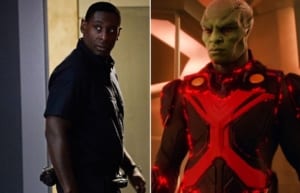 The “Hank Henshaw is actually J’onn Jonzz/Martian Manhunter” reveal was one of the best twists we’ve seen for a long time. Take note screenwriters, this is how you do shocking without being Shocking™. Plot twists need not involve character deaths or violence or abuse or rape to be interesting. Secret identities with adequate foreshadowing replete with creepy overtones that turn out to be completely innocuous and also fucking cool? Yes please.
The “Hank Henshaw is actually J’onn Jonzz/Martian Manhunter” reveal was one of the best twists we’ve seen for a long time. Take note screenwriters, this is how you do shocking without being Shocking™. Plot twists need not involve character deaths or violence or abuse or rape to be interesting. Secret identities with adequate foreshadowing replete with creepy overtones that turn out to be completely innocuous and also fucking cool? Yes please.
Ahem. J’onn J’onzz. You can tell so much about him as a character by comparing the flashbacks to the real!Hank Henshaw. J’onn values diversity and equality, his distrust of aliens in the first few episodes being merely a façade he evokes to prevent suspicion that he is not, in fact, real!Hank. Real!Hank has a shoot aliens first ask questions later policy. When real!Hank ran the DEO, men monopolized the department. Under J’onn, the DEO evinces equitable hiring practices, the uniforms are truly gender neutral, and when J’onn is arrested, he makes Alex the acting head of the DEO.
He shatters just about every trope tied to toxic masculinity that exists. He’s comfortable in a skirt. He’s intimidated by a Cat Grant (then again, who wouldn’t be?). He talks about his feelings, weeps for his family, and openly displays affection for Alex and Kara. He’d rather have Kara believe he killed Astra not because he thinks he knows best or can handle Kara’s rage better than Alex, but because he doesn’t want to see Kara’s and Alex’s relationship fall apart. None of it makes him any less authoritative, or masculine either. His presence fills the room without being threatening. He confronts and admonishes female characters without being condescending. He’s gentle but strong, affectionate but serious, and determined to make the Earth a better place for both humans and aliens alike.
He’s also full of sass and has some of the best one liners on the show:
Jemm: Bow your head when you approach me! I am Jemm, master of the Faceless Hunters! Conqueror of…
J’onn J’onzz: Twelve worlds. Yeah, heard you the first 10 times. It’s not getting any more impressive.
—
“Now I see how much more advanced you are than us savages.”—J’onn, when Non threatens him by snapping another alien’s neck.
“Touch my face, lose your hand.”—J’onn, when pretending to be Supergirl and Winn thinks (s)he is wearing a mask.
J’onn’s experience as a minority and a refugee hiding his true identity to avoid being killed have not embittered him. Instead, he made the choice to stay live as Hank in order to do the most good for humanity. He’s willing to out himself and be imprisoned to rescue Kara from red kryptonite. He’s willing to go on the run with Alex to help her find her dad, then risk being caught and recaptured when National City is under attack from Myriad.
We can’t emphasize this enough. He’s willing to sacrifice his powers, his identity, his relationship with Kara, and even his life to help a race of people who tried to kill him the first time he set foot on their planet. He would have every right to be angry or seek revenge. Instead, he chooses compassion and self-denial. He makes a home for himself on Earth and spends the rest of his life making that home a better, safer world than the one he came from.
The Supporting Heroes: Lucy Lane
 When first introduced, the audience expects her existence to revolve around the love triangle her presence creates. She’s the dreaded ex, a character to be despised, hated, and gotten rid of once the proscribed amount of angst has been sprinkled throughout the season. According to the expected formula, you’re not supposed to like her, much less sympathize with her perspective. Trouble is, Supergirl likes to subvert expectations not conform to them. Lucy defies the stereotypical behaviors and storylines associated with the ex-turned-current girlfriend, and we love her for it.
When first introduced, the audience expects her existence to revolve around the love triangle her presence creates. She’s the dreaded ex, a character to be despised, hated, and gotten rid of once the proscribed amount of angst has been sprinkled throughout the season. According to the expected formula, you’re not supposed to like her, much less sympathize with her perspective. Trouble is, Supergirl likes to subvert expectations not conform to them. Lucy defies the stereotypical behaviors and storylines associated with the ex-turned-current girlfriend, and we love her for it.
First, she’s an intelligent, competent, skilled, well-educated woman in her own right. She went to West Point and earned a commission as a 2nd Lieutenant (currently a Major), then to Harvard for her law degree. She worked for the Judge Advocate General (JAG) as a prosecutor, and when the season starts is a legal attaché to her father, General Lane. When Lucy resigns her military commission to be with James in National City, Cat Grant takes her on as Catco’s general counsel and mentors her through balancing her relationship with James and her work.

Then, you expect the stereotypical ‘woman leaves work for her man, gets dissatisfied with playing second fiddle to his work, and leaves story. Instead, Lucy’s high level of job satisfaction causes James to question his own lack thereof. She leaves Catco not because she doesn’t enjoy working there, but because of her breakup with James. She returns to JAG, ends up acting head of the DEO, and plays a major (heh) role in getting J’onn released and reinstated. She stands up to General Lane despite being both his daughter and subordinate officer. She asks for help when she needs it, even from Kara of all people.
The trajectory of the love triangle does not follow conventional form either. Yes, there are moments where Lucy expresses jealousy toward Kara and Supergirl (not realizing they’re the same person). However, her feelings and behavior are always treated as her responsibility and she handles them like an adult rather than blaming them on James or Kara.
She’s also not wrong about James. He does prioritize his relationship with the supers in his life over his relationship with Lucy. He does open up more to Kara than her. When Lucy finally breaks up with James because she realizes he loves Kara, you actually feel for her. As much as we ship James x Kara (which is a LOT), we both had twinges where we wished James and Lucy had been able to work things out. That’s how much sympathy the show has been able to create for her over the season.
It helps that Supergirl never allows the romantic relationships to dominate the storytelling. It prioritizes friendship and mentorship relationships as emotional rocks for the protagonists, rather than romantic ones. Kara, James, and Lucy get fulfillment and happiness from non-romantic relationships, and it’s explicitly shown in a way that implies that the characters are perfectly fulfilled without romance. Nobody needs a romantic partner, it’s just sort of icing on the Life Cake, which is more like mature adult life than not. If you expect the teen preoccupation with sex and romance, this is not the show to find it. Basically, it’s a show about 20+ year old adults that features mature adult relationships of all kinds.

The Sympathetic Villains: General Lane
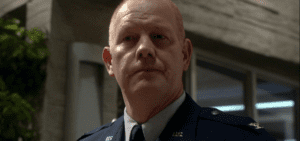 At first glance, General Lane represents all that is terrible about racism, misogyny, and xenophobia all rolled into one. He’s a patriot and staunch protector of national security, but that’s about all that’s good about him. He tests weapons designed to kill Kryptonians against Kara with no qualms. He rejects James as “good enough” for Lucy in a not-so-subtly racially coded conversation over dinner. He tortures Astra with kryptonite without flinching because he believes it necessary for the greater good.
At first glance, General Lane represents all that is terrible about racism, misogyny, and xenophobia all rolled into one. He’s a patriot and staunch protector of national security, but that’s about all that’s good about him. He tests weapons designed to kill Kryptonians against Kara with no qualms. He rejects James as “good enough” for Lucy in a not-so-subtly racially coded conversation over dinner. He tortures Astra with kryptonite without flinching because he believes it necessary for the greater good.
At the same time, the show takes pains to soften the rough first impression he give soff. He’s anti-alien, and also fiercely protective. The “right thing” for General Lane flows from his desire to protect people, albeit in an eerily familiar way. He believes so fiercely in protecting his country from aliens, all of whom are potentially violent invaders, that he is willing to go to any lengths to achieve safety. This extends to his daughters as well. From what we see of his relationship with Lucy, he’s not so much a misogynist as he is benevolently sexist and paternalistic. He knows what is ‘right’ and ‘best’ for people because he’s been in war and knows how harsh the world can be. His dislike for James is a cipher for racism, and also represents Lane’s sincere desire for Lucy to succeed. He’d rather her pursue a military career by his side than “give it up” for James. He values loyalty, patriotism, and safety, but has little time for idealism, optimism, and hope.
One gets the feeling that General Sam Lane views Kara (and the other aliens) less as a person and more as a nuclear bomb. They’re powerful, dangerous, and potentially explosive if under the wrong person’s control. If he the government cannot control them, they must be destroyed, or at the very least contained with a contingency plan for their destruction in place (like Red Tornado). Supergirl is a military asset, not a being with free will.
At the same time, his dehumanization makes sense given how dangerous she could (and does) become without proper restraint. The J’onn/Astra torture scenes in “Blood Bonds” create an interesting parallel between Non and General Lane. Lane believes himself to be better than and protecting the earth from Kryptonian destructive power. Instead, he proves himself to be as brutal and violent as the beings he fears, and all to no purpose. He’s the destructive force in this scene, not Kara, and could have accomplished more if he’d chosen de-escalation and negotiation, as Kara and Alex do.
As the season progresses, Lane shifts his views on aliens and their threat potential. Like Senator Miranda Crane, he seems to be learning how to distinguish aliens based on the choices they make, not their planet of origin. One could argue that he only changes his tune because J’onn and Kara save Earth from Indigo and Non. It’s a fair assessment, but still a step in the right direction. We detect a grudging acceptance in Lane’s willingness to accept J’onn’s presidential pardon and reinstate him as head of the DEO. He may not be as gung-ho about aliens as Senator Crane seems to be, but he’s moving that way. He’s even learning how to accept his daughter’s life and friend choices.
The Big Bads: Silver Banshee
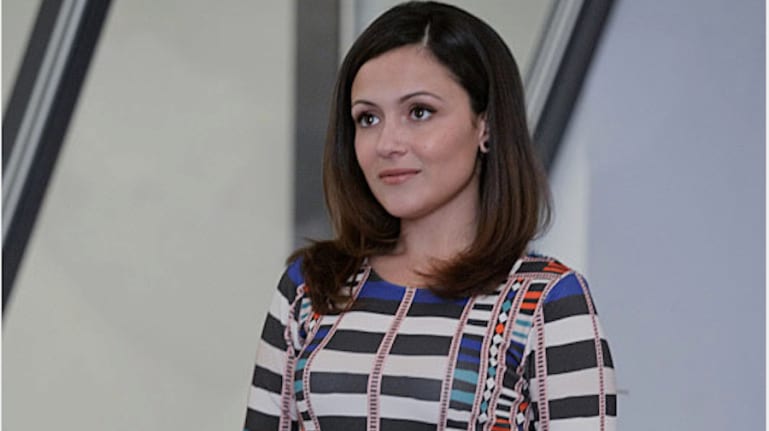 Like Livewire, the Siobhan Smythe’s metahuman persona the Silver Banshee evolves from actions taken by our protagonists. Although Cat fired her and blacklisted her from getting another job as a journalist, Siobhan blames Kara. According to Siobhan’s aunt, that makes Kara the target of the family curse fueled supersonic shrieking. One could argue that Kara merely fought pettiness with pettiness, that she was finally standing up to Siobhan’s ridiculous catfighting. Siobhan got a taste of her own throw-everyone-under-the-bus-to-climb- the-corporate-ladder medicine when Kara informed Cat of Siobhan’s attempts to leak the Diamond Indiscretions dox list to Perry White at the Daily Planet.
Like Livewire, the Siobhan Smythe’s metahuman persona the Silver Banshee evolves from actions taken by our protagonists. Although Cat fired her and blacklisted her from getting another job as a journalist, Siobhan blames Kara. According to Siobhan’s aunt, that makes Kara the target of the family curse fueled supersonic shrieking. One could argue that Kara merely fought pettiness with pettiness, that she was finally standing up to Siobhan’s ridiculous catfighting. Siobhan got a taste of her own throw-everyone-under-the-bus-to-climb- the-corporate-ladder medicine when Kara informed Cat of Siobhan’s attempts to leak the Diamond Indiscretions dox list to Perry White at the Daily Planet.
As always on Supergirl, it’s more complicated than that. In the feminist world Supergirl occupies both revenge and pettiness (especially of the women vs women variety) are never valuable goals, not even when we think the character deserves it. By consistently framing female catfighting in a negative light (e.g., Katherine Grant), Supergirl complicates audience satisfaction with seeing Siobhan fall. We might want her to get what’s coming to her, but when it occurs at the expense of our lovable puppy dog Kara’s sanity and personality, it’s hard to cheer for it.
Plus, Siobhan has legitimate reasons to be upset. Supergirl never lets the audience forget that. Kara’s red kryptonite induced pettiness cost Siobhan her job. Her father had an account on Diamond Indiscretions and his cheating ways destroyed her home life. She does not know how to trust anyone, so she walled herself off. She throws herself into her career at the expense of everyone else because she’s trying to cope with her pain. And yet, in the words of Jake Peralta, “Cool motive, still murder.”
Supergirl highlights Siobhan’s choice in how to proceed with her newfound powers and animosity. Like Livewire, Siobhan is given a chance to move on, twice. She chooses to try and ruin Kara’s career in revenge. When that fails, she blames Kara for the ensuing blackballing of her own career, leading to the discovery of her supersonic powers. She’s given another chance to choose light once those powers reveal themselves. She even asks her aunt what would happen if she chose not to destroy the target of her rage. The aunt responds by soliloquizing about to how powerful Siobhan will become the longer she fails to kill her target. She is clearly enamored with the power the curse gives them as women capable of utterly destroying their enemies, and so is Siobhan. She chooses the path of revenge and hurting others instead of moving on. She never asks if removing the curse is an option, much less pursues it. Like Livewire, she embraces the power to hurt, kill, and enact revenge against the ones who have hurt her.
“So I can pretend to be nice like everyone else? You know, they just pretend that you’re their friend, or that you can count on them, or that they won’t cheat on your mom anymore, but it’s just pretend.”—Siobhan Smythe, to Winn
Supergirl does not excuse her choices. She may have a tragic backstory—and one that the writers took pains to reveal prior to her villainification. But, the show refuses to woobify or leather pants her. Her story highlights just how much choice plays into what makes someone a villain. It isn’t their tragic past or their pain. There’s a reason Winn plays opposite Siobhan so much, why he reaches out to her. Because they share much of the same story: fucked up father-child relationship, a family curse/illness that seeks to define them, hurt by Kara. In the face of that, Winn chooses light and urges Siobhan to do the same. Ignoring his advice, she chooses to let her pain define her and turn her into a villain.
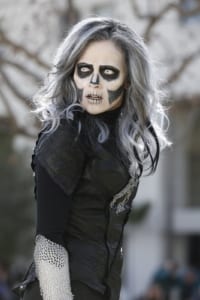
Theme: Choice, Consequences, and Accountability
We’ve talked a bit about this before, because it is so central to Supergirl’s narrative structure, but we want to go into detail about how both heroes and villains are defined by their choices as opposed to their past histories or families or pain or backstories. Everything about Kara as Supergirl stems from her choices: creating a team instead of flying solo, radiating hope instead of darkness, working for Cat Grant at Catco. The show gives Kara choices about who and what she wants to be and do as a hero. She can back out at any moment or approach her life as a superhero and normal person in a different way. She’s never locked in. Even becoming Supergirl is a choice that she makes rather than a destiny she embraces or a mantle she takes up from Superman.
“I can’t choose this for you, you have to choose it yourself.”—Alex Danvers, to Kara about the Black Mercy
Kara also makes a point of always giving her opponents an opportunity to make a choice to change their path, and will continue to offer that option over and over again until it is no longer feasible for her to do so. It is important to note that Kara is offering an opportunity, rather than making a demand; it’s common for the darker flavors of superheroes stories to scoff at the idea that simply asking nicely will get villains to stop what they’re doing, but Supergirl at least gives it a try before starting to punch them into submission. With the exception of being under the influence of mind-altering drugs, Kara never really loses her belief that people will do the right thing if you give them a proper chance to. The season finale hammers this point home in the least subtle way possible (and we’ll get to that next week).
Same with the other protagonists. Lucy, Cat, Alex, Eliza; these women make conscious choices to help other people and be heroes in their own right. Cat chooses to accept and spread hope and optimism rather than fearmonger or let Catco become a cheap tabloid, both of her own volition and because of Kara’s influence. Eliza Danvers uses science to understand and help alien species. Alex utilizes her skills to protect Earth, Kara, and to ensure equal treatment of alien refugees. J’onn chooses empathy, compassion, and helping humanity over bitterness and revenge. Winn chooses healing and community over isolation and fear. Over and over again Supergirl reinforces the idea that a hero isn’t something you are because of powers or privilege, it’s something you choose.
The same applies to villains. Livewire and Siobhan have legitimate grievances against Cat and Kara. Non and Astra set out to save Krypton and Earth from ecological destruction. General Lane and Maxwell Lord express understandable fear in the face of superhuman beings with massive destructive power and zero oversight. None of that changes their place as antagonists in the narrative. Good intentions and sympathetic reactions to real and perceived threats are never excuses for unethical behavior.
Neither are tragic backstories. Supergirl frequently pairs protagonists and villains up with similar backstories to highlight that how one reacts to painful experiences, mental illness, personal tragedies, and loss defines people, not the events themselves. Winn vs Toyman, Winn vs Siobhan, J’onn vs Non, Astra vs Alura, Kara vs Astra…you get the idea. Their choices define which side they’re on. And being a victim is never an excuse to victimize others. When Cat takes her mother’s verbal abuse out on Kara, for example, Kara calls her out on it. Kara learns to redirect and understand her anger rather than take it out on bad guys. Siobhan put up walls because of her broken family, and she could have taken them down instead of taking it out on Kara.
Not that we don’t sympathize with the villains choices. We do. The narrative explains the villains’ choices in a way we can understand and even relate to yet without excusing or justifying it in any way. It’s a fine line to walk, but Supergirl does it with grace and nuance. The narrative recognizes how broken people can be while also recognizing they can be better than their collective tragedies, especially when they are in positions of power and influence.
“When you have more power than any human army on earth, you have to be better than this.”—James Olsen, to Kara about Lord’s imprisonment
One spot of inconsistency in the show’s depiction of actions and consequences, that has been pointed out by various fans, is Maxwell Lord’s imprisonment by the DEO. He is arrested without a warrant and held for an unspecified number of days without due process despite being human. In addition to this, no one except Cat Grant seems to notice that he is gone. Let’s start off by immediately admitting the lack of fanfare over Lord’s disappearance is, in fact, a plothole.
He’s a humongously famous individual who is always in the spotlight, and while we don’t know precisely how long he was gone, we do know that it was long enough that it would cause a media circus. With that out of the way, let’s tackle the second half of the issue, as it makes an excellent in-depth case study for the way the show handles actions and consequences: why none of the heroes are punished for imprisoning Maxwell Lord.
The DEO, as we are told within the first few episodes of the series, is a secret government agency that is officially non-existent, and acts outside of the usual restrictions placed on government and law enforcement agencies. This is the only way they can do their job, as their day-to-day operations require them to be able to imprison people indefinitely, violate privacy with investigatory measures, and generally do all the things the US government has the right to do in real life to people who make it on the terrorist watch list. Given how there are direct comparisons of the DEO to Guantanamo Bay at more than one point during the season, we believe that the writers were making a not-so-subtle analogy to the extremism of counter-terror measures. Maxwell Lord’s imprisonment is, in fact, acknowledged as wrong by James, it’s just not a primary arc within the 2 episodes his imprisonment lasted.
But what about consequences? Well, we propose that the reason there aren’t clear consequences for Maxwell’s imprisonment is because it was a consequence for his actions. Lord has basically gotten away scott free with the shit he’s done up until this point in the series. Experimenting on comatose teenage girls, killing 6 in the process? No repercussions. Blowing up his own lab and hurting dozens of people in the process, almost killing several hundred on the train, and the suicide bomber dying? Zero repercussions. Creating a fake kryptonite substance that could have killed, if not drove Kara mad and causing destruction and emotional pain in the process? Zero repercussions.
Now, why did Lord do all of these things? So he could develop Bizarro, his own weapon against Supergirl. Whether or not the development of weapons based on alien technology (remember, he is using Supergirl’s DNA and the DEO’s kryptonite samples to develop Bizarro) is illegal in Supergirl’s universe is never stated, but we do know that the DEO has the authority to protect earth from alien threats. Maxwell Lord has twisted that poor Jane Doe’s DNA enough that she is no longer human, therefore he has weaponized alien technology. We would argue that Alex did, in fact, have jurisdiction to arrest him on those grounds.
While that’s a Honeypot Theory, since the show does not explain it this way, we believe it adheres to the show’s own rules tightly enough to have some legs. If we accept this interpretation of events, then we have to ask; why should any of the heroes face consequences for their actions? The person who is receiving consequences for his actions is Maxwell Lord. He deserves to be locked up for what he did, and he is rich enough that it would literally take an organization like the DEO to arrest him. The DEO is the only place that can deliver justice for the six women he murdered, the collateral damage he did cause, and the collateral damage he potentially could have caused (he almost blew up his own train, Batman style. Remember that?).
The show could have left him in his collector’s case for the rest of its run, or turn him into a primary villain, but instead they chose to give him a redemption arc. If we’re being honest, we’re glad that he did receive punishment for his actions before getting one, because a lack of consequences for protagonists is a genuine problem in a lot of television and film lately.
In a lot of modern (especially Grimdark) storytelling, once tagged as a protagonist, a character can get away with anything even if their actions are objectively wrong and horrifying. One of the problems with Batman versus Superman (which Elizabeth watched again this week because she likes to suffer for your amusement) is that the relative morality of a character’s actions is determined by whether or not a character is a protagonist, not whether or not what they did is actually good or bad, and pays little to no lip service to this characterization issue. Everything that Batman does in BvS ranges from questionable to outright monstrous, and the audience is just supposed to accept it as a necessary evil without the narrative giving a compelling reason for it.
We’ve heard Maxwell Lord being compared to Bruce Wayne quite frequently, and this situation is where the comparison is most apt. Both Lord and Wayne (Nolan and Snyder’s Bruce Wayne, obviously. 90’s Batman would never do this) are extremely rich individuals who use their fortune to solve problems in ways they believe are right, and both Lord and Wayne do awful things in the name of what they believe is right. The difference is that Lord is held accountable for his actions in a meaningful way, and being held accountable for his actions (and being shown mercy at the same time) is what moves his character forward into his redemption arc, not because the plot needs a Super Genius to deus ex machina the crap out of the villain’s master plan.
While Supergirl falters a little bit in acknowledging all of its heroes’ problematic actions, it makes a conscious effort to draw attention to the ones most important to the narrative, and it definitely doesn’t excuse the heroes acting badly without even hanging a bat-eared, matte black lampshade on the issue. (Don’t think we forgot about the whole destroying the rail system thing and violating the privacy of every citizen in Gotham, Nolan). In order for a character’s choices to matter, the character must be held accountable for the consequences of those actions in a meaningful way.

Even Supergirl herself is not immune to being held accountable for her actions; while the show acknowledges and sympathizes with kara not being in control of herself under the influence of the red kryptonite, she also must take it upon herself to apologize for her actions and earn back the trust of the people. No one owes her forgiveness, it must be earned. And that is a piece of the fallen hero arc that is glaringly missing from a lot of contemporary superhero stories.
The divide between heroes and villains in Supergirl, like any other good story, is a bit blurry around the edges. But what ultimately decides who is on which side is a character’s choices, not the plot’s whims. Supergirl, Maxwell Lord, and General Lane redeem themselves through hard work and good choices. On the other side of the coin, Livewire and Silver Banshee become true villains because they choose not to take the high road when the opportunity is given to them. When characters serve the plot, instead of the plot serving the characters, choices don’t actually matter: the plot determines who is good and who is bad, and this is a terrible way to approach morality (or writing in general, if we’re being honest). If there is one reason we’re going to shove Supergirl up on a pedestal and stand guard by it, it’s that the show gives meaning to the character’s choices by providing appropriate and meaningful consequences for those choices, and by ensuring that it is those choices that drive the plot, not the other way around. That’s a low bar to set, once again a lot of television just limbos right under it.
Spotlight On: Coded Language and Experiences
A few weeks back, CJ tackled the racial coding both in and out of canon, but coding can be used as more than a way to depict diversity of individual characters. Sometimes, writers will use linguistic coding as way to discuss experiences, especially minority group experiences. It does not mean that the character using this language belongs to that specific minority group, only that their experience and story explores the experience of that group. Star Trek: The Original Series, for example, used coded language in the episode “Let That Be Your Last Battlefield” to discuss the experience of racism and racial tension.
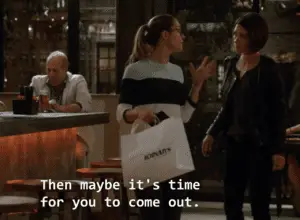
Supergirl uses layers of coded language to explore the experiences of various minority groups. Kara and J’onn talk about their decision to live as superheroes in terms of ‘coming out’, an LGBT coded term. This does not make either of them an LGBT character (though they might be, we don’t know). Rather, the purpose of such language is that the audience comes to understand Kara and J’onn as representing LGBT experience. The need to ‘hide’ oneself from the culture for fear of being exposed and met with fear, loathing, or violence. The desire to have a socially acceptable ‘face’ that one presents to society, the ‘alter ego’ (i.e., Kara Danvers, Hank Henshaw). The feeling of being at war with oneself, not fully honest or real until you embrace and live the truth. These are experiences common to the LGBT community. Thus, the coded language allows the audience to interpret the characters’ experiences as standing for something else. Given that Ali Adler, one of the main writers for the show, is an LGBT woman, it is unsurprising that the LGBT experience is one of them.
But Supergirl doesn’t stop there. J’onn’s backstory reads as Jewish: a more powerful alien race forces his people into labor camps that soon turn into death camps, and he is the only survivor of the genocide and holocaust that ensued. The hostility and fear J’onn and Kara both experience invokes immigrant experience, but in different ways. J’onn is a refugee from genocide met with suspicion and hostility by the dominant culture. To avoid capture and death, he takes on the physical appearance of a human being and lives as a human. He lives in the culture, but is not truly accepted or assimilated into it because they do not know he is not ‘one of them’.
While also a refugee from a mass extinction event, Kara was adopted into the dominant culture vis-a-vis the Danvers family and seeks to ‘pass’ as normal for most of her life. Mr. Dr. Danvers makes her a pair of glasses to mask her x-ray vision and trains her to control and ignore her Kryptonian powers so that she can live life as a human. She cannot fully assimilate, as she is fundamentally too different from the culture and feels compelled to use her abilities to help other people, but she can live more openly as a superhero than J’onn can. She can fly around National City as her true self because she has a conventionally attractive face.
“Your sister looks like a pretty blonde cheerleader. J’onn J’onzz looks like a monster. I will never be tolerated here on Earth. The more time I spend as Hank Henshaw, the less I have to face what I’ve lost. But when I change my state, shapeshift into someone new, call upon new powers, I get one step closer to becoming the Martian Manhunter forever.” —J’onn Jonzz
This lends a deeper significance to the depiction of species profiling and torture depicted in Episode 9. Astra’s horrific torture at the hands of a government agency for information about her colleagues’ violent plans…well there’s a reason that James calls the DEO “Guantanamo” (Episode 14). Rather than being an acceptable means to gain information (looking at you ALIE), we’re meant to sympathize with Astra and decry her inhumane treatment, which ought then to impact how we perceive the treatment of real world prisoners in the United States.
“Holding people indefinitely against their will? Nothing more American than that.”—Maxwell Lord, about being imprisoned by the DEO
Notice a pattern? The minority coded language is used for, you guessed, it the minority characters, in this case, the aliens. The show is still careful to balance out this language with the recognition that the alien beings have a lot of real power over the majority, not just perceived danger. Astra, J’onn, and Kara could all be real threats to the human population because of their powers. What distinguishes them is their choices, which is another coded system with resonance in our current political struggle regarding Muslim refugees. What makes a refugee a danger is not their inherent (or perceived) power, but the choices they make. And we can’t profile someone’s choices based on physical characteristics or geographic origin. Mars has both dangerous and peaceful species (and with a White Martian character seeded for this upcoming season even that might change). Krypton has both dangerous and helpful individuals.
There is an additional point that we feel is important to address about using coded language when writing about social issues. It’s one that comes up a lot with stories in which the oppressed minority is superhuman in some manner, whether it be literal superheroes (as in Supergirl), augmented human beings (the sci fi sector, as seen in Deus Ex), or magic wielders (fantasy, as in Dragon Age). There is a tendency in fandom to side strongly and passionately with the oppressed minority, because oppression is highly relatable, and oppression is bad (and we are not arguing otherwise, *obviously*) while disregarding the aspects of the narrative that have no real-world analogous factor. Superhero stories in particular have recently been banging very hard on the Immigrant/Terrorist Analogy drum, but what we don’t necessarily see a lot of discussion about is how overly simplistic the analogy becomes. Obviously, oppression is bad, but the situation is not simple when the oppressed minority is a superhuman or magical threat to society.

Since there is no real-world equivalent to superpowers this should, in theory, should make the oppression analogy more muddy and ambiguous, but that’s often not how it’s treated in fandom. Frequently it’s not even treated that way in the canon. Something that Supergirl does noticeably better than some of its companion stories, and without resorting to histrionic exaggeration or black-and-white simplification, is both 1.) acknowledging that profiling, discrimination, and oppression is wrong, and 2.) not falling into the trap of ignoring the fictional dangers of its superhuman characters. It handles this balance well in large part to its stubborn refusal to dive headfirst into GrimDark territory whenever the relative morality starts resembling the color of concrete.
The heroes who possess superhuman abilities are remarkably self-aware of the responsibility they possess. While they aren’t obnoxiously selfless in accepting their responsibility, they also stop short of falling off the deep end of bitterness and/or a martyr complex. In short, what Supergirl does well is use analogies for oppression without becoming hypocritical in its analogy (about 90% of the time) and without excusing bad behavior just because it is a realistic and/or reasonable reaction to oppression. It also makes the line between the fictional half and real half of the analogy quite clear, instead of taking the lazy way out and relying entirely on the implied analogy to tell the audience who is right and who is wrong. Supergirl uses coded language to enhance the narrative, rather than being a substitute for it.
Extra Tidbits
- So many feels this arc. SO. MANY. FEELS. (Gretchen’s notes for these episodes are mostly the word ‘feels’ over and over again).
-
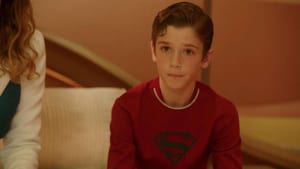
Look at baby nerd Kal El. Clark Kent/Kal El was apparently always an adorable nerd, if Kara’s Black Mercy dreams are to be believed. Also, looks like he always had the hair curl.
- The actress playing Indigo/Braniac 8, Laura Vandervoort, played Kara Zor-El on Smallville.
- Did you catch the shout out to Superman 3 in “Falling”? Kara shoots peanuts at bottles in a bar like this.
- Melissa Benoist playing Kara playing J’onn playing Kara is excellent (Episode 13). Melissa Benoist is a rockstar. Her acting as Bizarro is equally impressive, including the use of different facial tics and vocal inflections. Someone give this woman an acting award stat.
- This show has one of the best answers to the ‘Revenge as Empowerment’ trope: “One tragedy cannot be undone by committing another.” Luzano in “Truth, Justice, and the American Way”.
- We love how the show plays up Kara’s dual self conceptualization as ‘human’ and Kryptonian. It’s when she embraces her humanity that she is a true hero, not when she embraces her Kryptonian past/heritage. This underscores that all humans can be heroes.
- Catch the Shakespeare reference in “Solitude”? “I know you of old” is a line from Much Ado About Nothing.
- The show goes out of it’s way to not use the word b*tch. Impressively so. There are several moments where you expect it, but it is always substituted for a different word. The only occurrence of the word is in the phrase “son of a bitch”, which is not used as a gendered slur against a woman.
- We despise coffee cups that are supposed to be full but move like they’re empty (because they are). Is it so hard to get something in there to simulate the weight of a beverage? Some clear gelatin?
- In the Superman comics, Bizarro (a Clone of superman created by Lex Luthor), steals Lois Lane, so it’s funny that Supergirl’s Bizarro steals James Olsen, who at the time is dating Lois Lane’s younger sister.
- When James flips that bottle in Episode 13? Whew *fans selves*
- The Kryptonite custom of having women lead mourning rites is one of those lovely pieces of female driven worldbuilding that we appreciate.
- Giving Non a period of mourning after Astra’s death? A+++++. Seriously. When have we seen male grief handled in such a straightforward, non angst driven way recently? Yes, he wants revenge, but he’s also given space to grieve in a realistic fashion. It’s done in such a way that indicates mourning is not just necessary, but more important than vengeance:
J’onn J’onzz: “Do you think he’s going to observe this mourning period?”
Kara Danvers: “Do you think he’s going to let his wife walk alone in the dark?”
- Where there are opportunities for depicting gratuitous violence/gore on screen, Supergirl purposefully avoids it. So refreshing.
- Winn calling Indigo/Braniac 8 a ‘glorified Window’s Vista’ brought joy to our gamer girl hearts, especially the implication of how shitty she is.
- We have no idea how all the women on the fake “The View” kept a straight face in that scene (Episode 16).
Until next week, as Alex would say: no thinking, just hugging.
